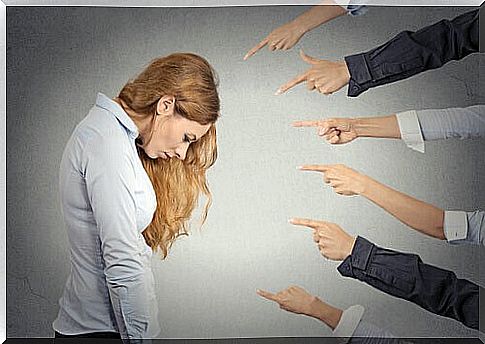Judging Others: A Common Habit In Frustrated People

People, whatever their religion, social status or origin, expect justice to be applied in society.
Talking about justice implies dealing with countless issues, but in this article we will focus on a plan that has nothing to do with canon law: we will talk about the psychological feeling of judging and being judged in daily life.
We could say that certain people do not judge situations in an isolated and punctual way, but assume the role of judges for the small events of the existence of others, without anyone having asked them to do so.
Why is society full of false judges? Why do they assume their value judgments are valid for them and others? How did you get to this point?
It will be interesting to see some characteristics that these robed judges share, as they act as the most harmful and toxic sentence executors in relation to everyone around them.

People who judge others:
– They tend to hate a large part of their lives and that’s why they try, as much as possible, to manage to intoxicate others.
– They are not satisfied with what they do and do not deal well with the fact that someone is satisfied.
– They are not easy to spot because they are not cold or mean people, but they are tremendously frustrated and frustration leads to aggression, which manifests itself in many different ways.
– They are tormented by the decisions they have made, possibly imposed by others or by circumstances unintended. They have a psychic conflict relationship with this type of event in their life.
– They want to justify the trajectory of their life by discrediting the lives of others. In some situations, they allude to the famous statement: “I’m not that bad, look at the girl’s life”.
– Without a doubt, they talk about people and not ideas.
– Give opinions in relation to others not in a global perspective that understands both the failures and successes committed by that person. They judge based on heuristics that anchor them in reductionism, simplicity and subjectivity.
– They tend to have values that are not used to calm themselves and their surroundings, except to judge others constantly.
– They do not have hobbies and activities that they consider interesting.
– They are very little self-critical with what they do. They don’t like to feel judged on a task that involves demonstrating their performance.
– They get irritated easily.

– The successes of others are due to external, unstable and specific causes, and yours to internal causes, not due to the situation. That is, your success is justified, but others’ is usually a product of luck.
– They do not usually express opinions in the presence of many people. It is not interesting for them as a practice, as it can make them stand out.
– Their criticisms reflect on most occasions the desire to experience what life has denied them or what they could not achieve.
– They don’t care about improving. They consider that the best way to stand out is to erase other people’s shine.
– Their judgments can range from light and private to public and dangerous.
We must ignore these people and never give them the power to damage our personal or professional reputation in front of a large number of friends, family or any other audience.
Faced with these people, ignorance can only be used as a weapon, although we must be alert and prepared so that they do not exceed the limits of our intimacy and privacy.









